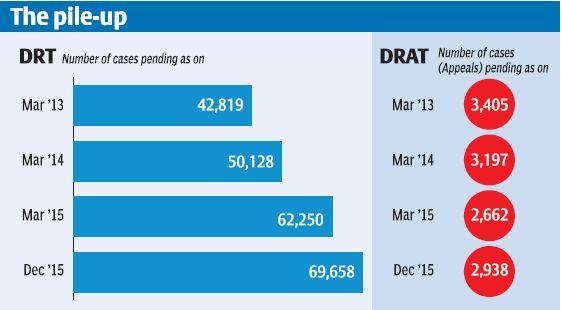
With the Insolvency and Bankruptcy Code inching towards reality, early redress of almost 75,000 cases involving debt of an estimated ₹3.5-lakh crore is what the government and stakeholders expect.
While the Debt Recovery Tribunals (DRT) will resolve individual bankruptcy cases, the National Company Law Tribunal will work on corporate insolvency.
The reasons for the pile-up of cases varied from legal lacunae to insufficient technical expertise in dealing with such cases. Labour and infrastructure issues also played a big role in hindering resolution. The time taken to close such cases was another major hindrance.
Time factor
The new Code, once legislated, will expedite such cases and resolve them within 180 days of the insolvency resolution process being started.
“There is a significant amount of work still to be done in creating the insolvency practitioners’ eco-system, the tribunals and the operating guidelines. But boards of companies will have to start re-examining how they deal with all classes of creditors once the code comes into place,” said Varun Gupta, Partner, Deal Advisory at KPMG India.
As many as 69,658 cases were pending with DRTs and another 2,938 appeals were pending with the Debt Recovery Appellate Tribunal as on December 31, 2015.
The number of original cases and appeals pending with the DRTs has also risen steadily.
Though the latest estimates are not available, officials indicate that this number may now have increased to at least ₹3.5-lakh crore. In 2014-15, the 33 DRTs in the country disposed of 14,033 cases involving ₹5,826.47 crore.
Finance Minister Arun Jaitley had said that almost 586 corporate litigation cases were pending for over 20 years with the Company Law Board, Board for Industrial and Financial Reconstruction and Official Liquidator, adding that efforts are being made to speed up resolution of such cases.
In 2014-15, the Company Law Board had 13,090 cases with it, including 7,269 new cases. It had disposed of 8,925 cases but another 4,165 cases were pending with it as on March 31, 2015.
Expanding framework
In anticipation of the new law, the Finance Ministry has already begun strengthening and expanding the framework of these tribunals. The Finance Ministry has also increased the working days of the tribunals and is also finalising amendments to the Recovery of Debts Due to Banks and Financial Institutions (RDDBFI) Act, 1993, under which the DRTs were set up.
It is also setting up six new tribunals in Bengaluru, Chandigarh, Dehradun, Ernakulam, Hyderbad and Siliguri.
As a precursor to the proposed online tribunals, it is also working on scanning and digitisation of legacy data as well as implementation of e-filing.
Source : www.thehindubusinessline.com
